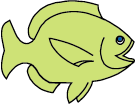

Goals:
Develop research skills through the use of CD-Rom encyclopedia and the Internet Develop a poster to represent information
Presentation of poster and information found in research to the class
Learn to work cooperatively with a group of peers to accomplish a goal and present information to the class
Resources:
1. Computer and Internet access
2. Encarta Encyclopedia CD-Rom or some similar type of CD-Rom encyclopedia.
* Topics to look up in Encarta Encyclopedia; algae, fish, plankton, shark, nautical history, deep sea exploration.
* Topics to look up in Encarta World Atlas; Atlantic Ocean, Pacific Ocean.
3. Internet Topics include:
Ocean Planet Smithsonian: http://seawifs.gsfc.nasa.gov/ocean_planet.html This site presents information on topics such as oil pollution, toxic wastes, sewage disposal, alien species, wetland destruction, and climate change. The Woods Hole Oceanographic Institution: http://whoi.edu/k-12/k12-resources.html This site provides a comprehensive list of oceanographic resources.
Materials:
Poster board, Markers, Scissors
Time:
This lesson will require 3-5 hours of class time to complete. (This mainly depends on how much research is allowed to be completed during class time.
Procedure:
1. The students should be divided into groups of three. 2. Following the introductory research lesson (part 1), the students will begin to do more extensive research on the causes and effects of pollution. To do this the students should use the CD-Rom Encarta Encyclopedia (or some type of multimedia encyclopedia). To begin their research, suggest the students look up general oceanography articles, such as oceans, oceanography, water pollution, marine life, and coral reefs. From this research students can gain a basic understanding and new vocabulary to better comprehend marine pollution issues.
3. Have students read this information, take notes, and highlight various material that will help them in proving their initial hypotheses about the causes and effects of certain kinds of marine pollution. The three main research questions are:
1. What are the sources of this type of marine pollution or destruction? 2. What are the effects of this type of pollution or destruction?
3. How has this pollution changed from in the past? What solutions have been found?
4. After the students have completed their initial background research on the encyclopedia, they can begin more in-depth research through the Internet.
5. While the students are researching on the Internet, make sure the content is read, notes are taken, and relevant external links are followed. Some of the external link topics contain information on plastics in the ocean, zebra mussels, classification of wetlands, manatees, ecosystems, coral reefs, and ozone depletion.
6. After the research related to marine pollution and the history of marine pollution has been completed, each group should list the different kinds of marine pollution , habitat destruction, and global changes that they found information about. Each problem that detrimentally effects marine ecosystems should be written separately on a small piece of paper or index cards.
7. After the problems have been written on the paper/cards, have the groups list possible causes and effects of each type of pollution, based on the information from their research, on the back. Each group should have at least five pieces of paper. Examples of pollutants are: Toxic contaminants, tourism, and ozone depletion.
8. On a piece of poster board, have each group begin to organize the pieces of paper/cards in an order that demonstrates the connection between the topics. The papers/cards should be organized in an order that demonstrates the relationship between both problems, causes, and effects. Encourage the students to be creative in their presentations of the information. (Example: Place human in the center to show how humans are responsible for all pollution and destruction and problems in the ocean.
9. Once the posters are completed, have each group give a 10 minute presentation about the topics of pollution they have represented in their poster. Encourage class discussion and questions. Also encourage brainstorming for potential solutions to these problems.
Assessment:
1. Each group will be assessed on their poster. See rubric. 2. Each group will also be assessed on their presentation of their poster and the information covered by their poster. See Oral Presentation and Poster Presentation Rubrics.
3. Each student will be evaluated on their contributions to the group. Each student is expected to do one third of the work done by the group. See peer evaluation rubric, group evaluation rubric, and self evaluation rubric.
Curricular Strands and Major Concepts:
1. Language Arts-writing, research skills, speaking skills, cooperation and communication. 2. Science- pollution, marine life, water quality, hypothesizing.
Possible Extensions:
1. Each student should select one marine pollution problem from their group poster and write a report defining the problem, its effects on the oceans, and a possible solution. 2. Have students write a solution "proposal" outlining a solution to a specific problem.
3. Students could interview individuals in the field, such as, politicians or research scientists who work to alleviate marine pollution problems.